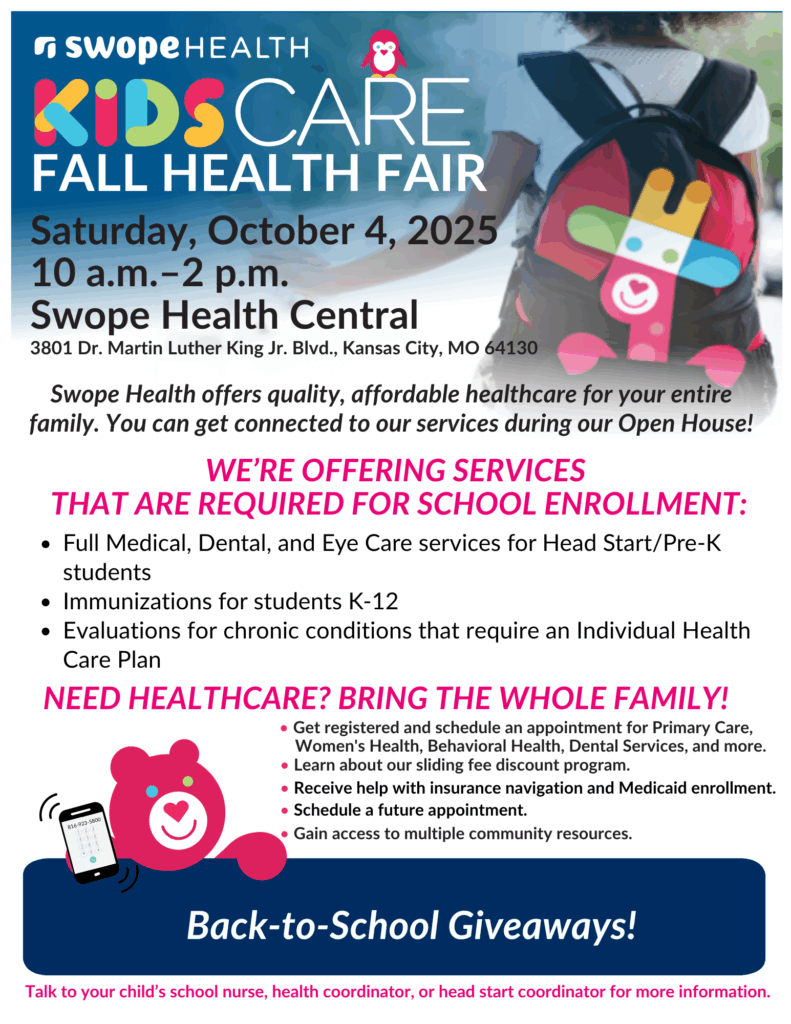Did you know this is High Blood Pressure Education Month? The National Heart Lung and Blood Institute, an agency of the National Institutes of Health, encourages you to learn more about hypertension, or high blood pressure.
At Swope Health, we talk with patients about controlling high blood pressure every day, not only in May. Nationally, the federal government estimates that more than half of Americans have high blood pressure, which is a major risk factor for heart disease.
“We absolutely encourage all of our patients to get their blood pressure checked and talk with us about what the numbers mean,” said Dr. Naiomi Jamal, Swope Health’s Chief Health Officer. “Most importantly, if the numbers are high, we want to help you get your blood pressure under control.”
Managing high blood pressure
If your doctor recommends lowering your blood pressure, there are several steps your Swope Health care team can help you can take.
Care Managers: Swope Health’s patients in the Primary Care Health Home Program (PCHH) may be eligible for personalized assistance from a care manager. In this program, the care manager works closely with you to help manage hypertension or other chronic disease. The program is designed to help patients live healthier and provide support for the steps to do so.
Diet: Eating nutritious foods is a great way to help manage your blood pressure. This will include avoiding salty foods, as sodium can raise your blood pressure. Avoiding fatty foods and sweets and adding fruit and vegetables to your daily intake are key guidelines. The National Heart Lung and Blood Institute has developed “Dietary Approaches to Stop Hypertension” or the DASH diet to offer simple tips. At Swope Health, you can consult with Priscilla Schmid, our licensed Dietitian/Nutrionist.
Priscilla earned a master’s degree in Public Health, has eight years of experience, holds more than 10 professional certificates, and is bilingual (Spanish and English). She works with patients on setting up meal plans and schedules, including tips on food buying on a limited budget and personalized nutrient needs. If you are interested in scheduling an appointment with her, please ask your Swope Health primary care provider to send a referral to Dietetic Services.
Medication: Frequently doctors will prescribe medication to lower your blood pressure, sometimes in a combination of medications taken daily. If you are on a blood pressure medication, it is important to take the medication regularly. Learn more about high blood pressure medications. Swope Health’s care managers assist with education on medications and establishing routines for taking medication daily.
Managing your weight: Losing weight can improve high blood pressure. Doctors advise regular exercise, at least two and a half hours of movement each week, to help lower blood pressure. Walking is a great exercise, and any movement can help. The Physical Activity Guidelines for Americans, produced by the Office of Disease Prevention and Health Promotion, offers tips and suggestions for adding movement into your daily routines.
 Managing stress: Research has shown that stress can increase your blood pressure. There are many ways to reduce stress, including simple deep breathing exercises, meditation, relaxing activities, yoga, and other exercises. Even getting enough sleep can help reduce stress. Counseling and therapy sessions can also help with coping mechanisms and tips you can use to reduce stress and anxiety.
Managing stress: Research has shown that stress can increase your blood pressure. There are many ways to reduce stress, including simple deep breathing exercises, meditation, relaxing activities, yoga, and other exercises. Even getting enough sleep can help reduce stress. Counseling and therapy sessions can also help with coping mechanisms and tips you can use to reduce stress and anxiety.
If you have questions about your blood pressure, start with a visit to Swope Health. Call 816-923-5800 to schedule an appointment today.
















